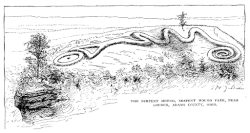| Periods in North American prehistory | ||||||||||||
|---|---|---|---|---|---|---|---|---|---|---|---|---|
 | ||||||||||||
|
||||||||||||
Several chronologies in the archaeology of the Americas include a Formative Period or Formative stage etc. It is often sub-divided, for example into "Early", "Middle" and "Late" stages.
The Formative is the third of five stages defined by Gordon Willey and Philip Phillips in their 1958 book Method and Theory in American Archaeology. Cultures of the Formative Stage are supposed to possess the technologies of pottery, weaving, and developed food production; normally they are very largely reliant on agriculture. Social organization is supposed to involve permanent towns and villages, as well as the first ceremonial centers. Ideologically, an early priestly class or theocracy is often present or in development.
Sometimes also referred to as the "Pre-Classic stage", it followed the Archaic stage and was superseded by the Classic stage.
- The Lithic stage
- The Archaic stage
- The Formative stage
- The Classic stage
- The Post-Classic stage
The dates, and the characteristics of the period called "Formative" vary considerably between different parts of the Americas. The typical broad use of the terms is as follows below.
North America
In the classification of North American chronology, the Formative Stage or "Neo-Indian period" is a term applied to theoretical North American cultures that existed between 1000 BC and 500 AD. There are alternative classification systems, and this ranking would overlap what others classify as the Woodland period cultures.
The Formative, Classic and post-Classic stages are sometimes incorporated together as the Post-archaic period, which runs from 1000 BC to the present. Sites and cultures include: Adena, Old Copper, Oasisamerica, Woodland, Fort Ancient, Hopewell tradition and Mississippian cultures.
Meso-America

In Mesoamerican chronology the Preclassic or Formative runs from about 2000 BC to 250 AD, covering all the Olmec culture, and the early stages of the Maya culture and Zapotec civilization.
South America
In the periodization of pre-Columbian Peru the Formative Period divides into 1) the Initial Period, from 1800 BC – 900 BC (sites & cultures: Early Chiripa, Kotosh culture, Cupisnique, Las Haldas, Sechin Alto), and 2) the Early Horizon or Formative Period, 900 BC – 200 BC, (Chavín, Late Chiripa, Paracas, Chankillo).
See also
References
- Willey, Gordon R. (1989). "Gordon Willey". In Glyn Edmund Daniel and Christopher Chippindale (ed.). The Pastmasters: Eleven Modern Pioneers of Archaeology: V. Gordon Childe, Stuart Piggott, Charles Phillips, Christopher Hawkes, Seton Lloyd, Robert J. Braidwood, Gordon R. Willey, C.J. Becker, Sigfried J. De Laet, J. Desmond Clark, D.J. Mulvaney. New York: Thames & Hudson. ISBN 0-500-05051-1. OCLC 19750309.
- Gordon R. Willey and Philip Phillips (1957). Method and Theory in American Archaeology. University of Chicago Press. ISBN 978-0-226-89888-9.
- "Method and Theory in American Archaeology". Gordon Willey and Philip Phillips. University of Chicago. 1958. Archived from the original on 2012-06-28.
External links
 Media related to Formative period in the Americas at Wikimedia Commons
Media related to Formative period in the Americas at Wikimedia Commons
| Pre-Columbian North America | |
|---|---|
| Archaeological cultures |
|
| Archaeological sites |
|
| Human remains | |
| Miscellaneous |
|
| |
| Indigenous peoples of the Americas | |||||||||||
|---|---|---|---|---|---|---|---|---|---|---|---|
| Pre-history |  | ||||||||||
| Mythology/Religion |
| ||||||||||
| Culture |
| ||||||||||
| European colonization | |||||||||||
| Modern groups by country |
| ||||||||||
| Related topics | |||||||||||
| Indigenous peoples of the Pacific Northwest | ||
|---|---|---|
| Archaeological sites |  | |
| Ethnicities |
| |
| Languages | ||
| People |
| |
| Places | ||
| Towns and villages | ||
| Armed conflicts | ||
| Court cases and treaties | ||
| Current issues | ||
| Miscellaneous | ||
| See also | ||